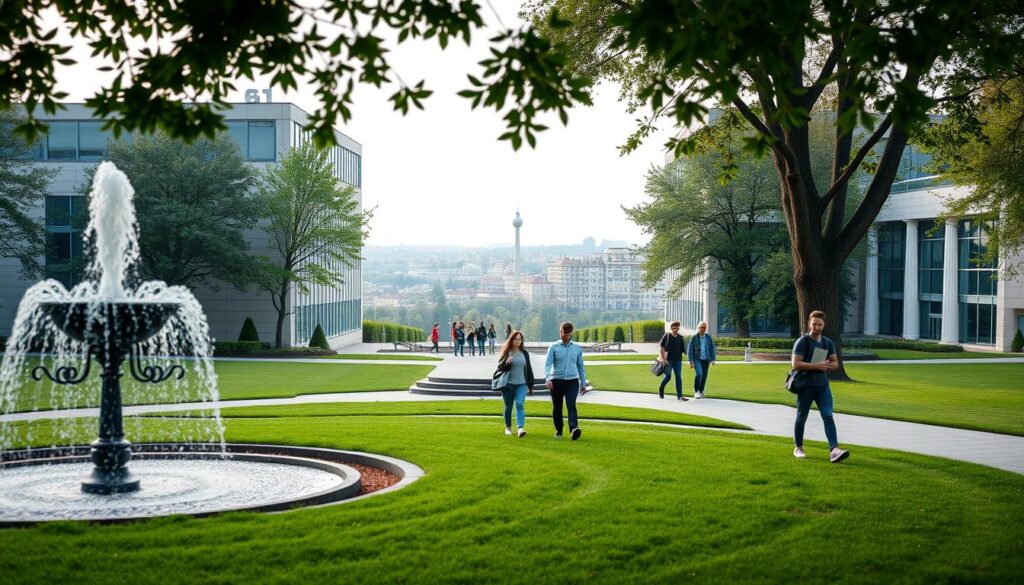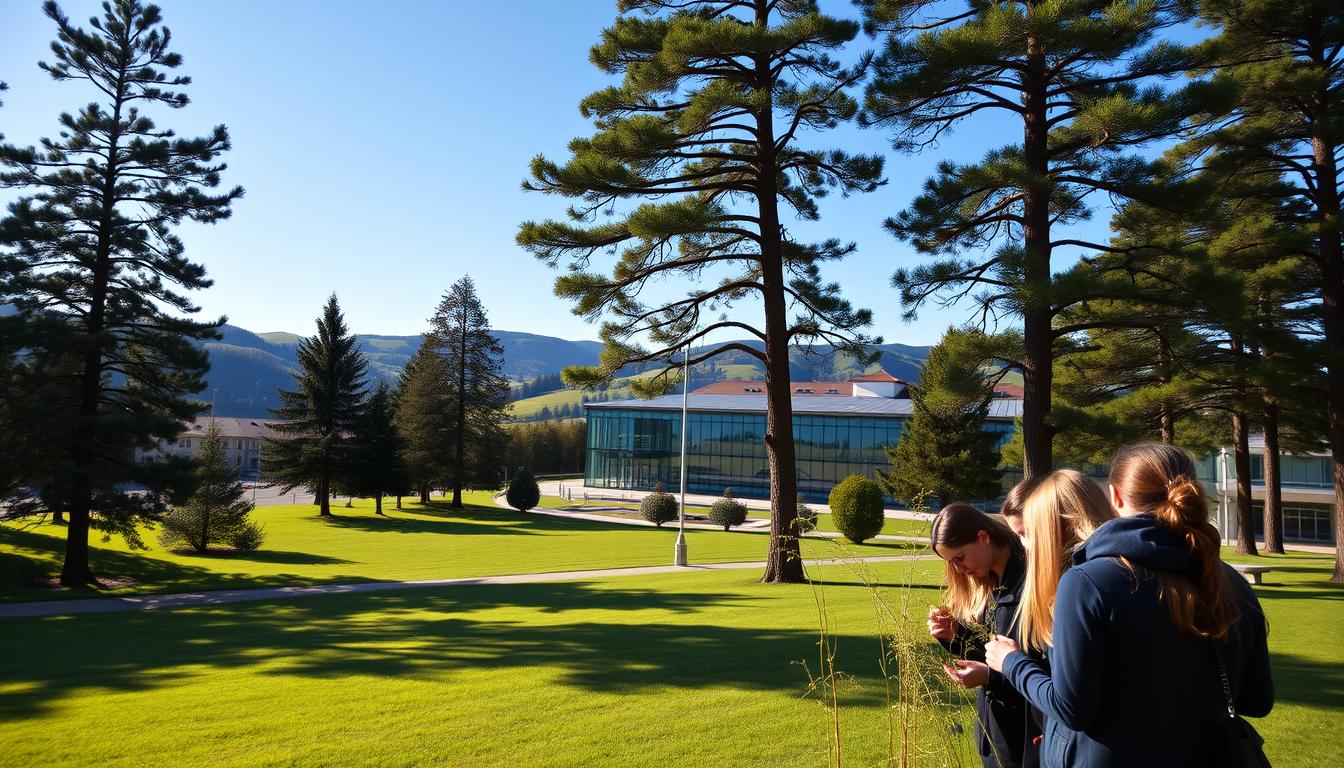Thinking about a degree in Plant Science in Lithuania? Lithuania is becoming a top choice for students looking for quality education at good prices.
It’s important to know the costs involved and the admission requirements. Plant Science program tuition fees differ. But, there are many scholarship opportunities to help pay for your studies.
Lithuania mixes old and new teaching methods, attracting students from all over. This article will give you a sneak peek into applying for a Plant Science program in Lithuania.
Key Takeaways
- Tuition fees for Plant Science programs in Lithuania vary by institution.
- Several scholarship opportunities are available for international students.
- Admission requirements include academic qualifications and language proficiency.
- Lithuania offers a unique educational experience with modern facilities.
- Programs are designed to cater to the needs of the global job market.
Overview of Plant Science Education in Lithuania
For American students thinking about studying abroad, Lithuania’s Plant Science programs are a great choice. The country mixes old and new teaching methods, attracting students from around the world.
The Lithuanian Higher Education System
Lithuania’s higher education system is solid, focusing on research and new ideas. It has many top universities with Plant Science programs. The system is open and flexible, helping students follow their interests.
Plant Science Programs Available
Lithuanian universities have Plant Science programs at all levels: Bachelor’s, Master’s, and Ph.D. These programs cover a lot, from genetics and biotech to green farming and saving the environment.
| Program Level | Duration | Key Topics Covered |
|---|---|---|
| Bachelor’s | 3-4 years | Plant biology, genetics, ecology |
| Master’s | 2 years | Advanced plant breeding, biotechnology, sustainable agriculture |
| Ph.D. | 3-4 years | Original research in plant science, dissertation |
Benefits of Studying in Lithuania for American Students
American students get top-notch education in Lithuania, with lower costs. They also get to experience a new culture. Plus, Lithuania’s location in Europe is perfect for exploring other countries.
Studying in Lithuania lets American students join a diverse academic community. This broadens their view and opens up more job chances.
Top Universities for Plant Science Courses in Lithuania
Lithuania is home to top universities for Plant Science education. These schools offer programs that prepare students for a career in Plant Science. They provide the knowledge and skills needed to succeed in this field.
Vytautas Magnus University
Vytautas Magnus University is a leading school in Lithuania. It’s known for its strong programs in natural sciences, including Plant Science. The university offers undergraduate and graduate programs in plant biology, ecology, and genetics.
International students are drawn to this university. They appreciate its research-oriented approach and modern facilities.
Lithuanian Research Centre for Agriculture and Forestry
The Lithuanian Research Centre for Agriculture and Forestry is a top research institution. It works with universities to offer advanced research in Plant Science. The center is known for its work in agricultural and forestry sciences.
It provides opportunities for PhD studies and collaborative research projects. This makes it ideal for students interested in applied Plant Science.
Aleksandras Stulginskis University
Aleksandras Stulginskis University is known for its programs in agriculture and forestry, including Plant Science. The university focuses on a practical approach to education. It emphasizes fieldwork and research.
International students can benefit from the university’s international collaborations and research facilities.
Vilnius University Plant Science Programs
Vilnius University is one of Lithuania’s largest and most prestigious universities. It offers a variety of programs related to Plant Science through its Faculty of Natural Sciences. These programs aim to give a comprehensive understanding of plant biology and its applications.
International students are attracted to the university’s academic excellence. They also value the opportunity to study in a diverse, multicultural environment.
These universities offer programs for all levels of study, from undergraduate to PhD. When choosing a university, international students should consider the program curriculum, research opportunities, and eligibility criteria. It’s important to understand the eligibility criteria for each program to ensure a successful application.
Plant Science Course in Lithuania Tuition Fees, Requirements, Scholarship Options
For international students, knowing the tuition fees and financial aid is key when choosing Plant Science in Lithuania. The cost of education is a big factor in deciding where to study.
Lithuania is known for its quality education and offers competitive tuition rates for international students. The fees for Plant Science programs differ by university and study level.

Average Tuition Costs for International Students
The average tuition for a Bachelor’s degree in Plant Science is between €3,000 to €6,000 per year. Master’s programs cost between €4,000 to €8,000 annually.
Vytautas Magnus University charges about €4,500 per year for a Bachelor’s program. Vilnius University charges around €5,000 per year.
Comparison of Fees Between Universities
Universities in Lithuania charge different fees for Plant Science programs. Here’s a comparison:
| University | Bachelor’s Tuition Fee (€/year) | Master’s Tuition Fee (€/year) |
|---|---|---|
| Vytautas Magnus University | 4,500 | 5,500 |
| Vilnius University | 5,000 | 6,000 |
| Aleksandras Stulginskis University | 3,500 | 4,500 |
Payment Plans and Financial Aid Options
Many Lithuanian universities offer flexible payment plans for international students. There are also scholarship options to help financially.
Students can look into government scholarships, university-specific merit scholarships, and international funding programs. Some universities also offer research grants and teaching assistantships to help with costs.
It’s wise for students to check with their chosen university for the latest on tuition fees, payment plans, and financial aid.
Admission Requirements for International Students
To get into Lithuanian universities, international students must meet certain standards. These include academic and language skills. Knowing these requirements is key for a good application.
Academic Prerequisites for Different Program Levels
For a graduate program in Plant Science, students need a Bachelor’s degree. This degree should be in fields like biology, agriculture, or environmental science. The needed degree changes with the program level.
- For Master’s programs, a relevant Bachelor’s degree is needed, along with a certain GPA. This GPA varies by university.
- For PhD programs, a Master’s degree in a related field is required. Some universities also ask for research experience.
English and Lithuanian Language Proficiency Requirements
Students must show they can speak English or Lithuanian, depending on the program. English language proficiency is checked through TOEFL or IELTS.
Language proficiency requirements are as follows:
- TOEFL: A minimum score of 80 (iBT) or higher is needed.
- IELTS: A minimum score of 6.0 or higher is required.
- For Lithuanian programs, a certified Lithuanian language test is needed.
Document Verification and Authentication Process
Students must send in documents like academic records and language test scores. These documents might need to be authenticated or apostilled.
The verification process includes:
- Getting documents attested by authorities in the student’s home country.
- Submitting original documents or certified copies.
Visa Requirements for American Students
American students going to a Lithuanian university need a student visa. To apply, they must send in their admission letter, proof of money, and health insurance.
Key steps for the visa application are:
- Getting the admission letter from the university.
- Preparing the needed documents, like proof of financial support.
- Applying for the visa at the Lithuanian embassy or consulate.
Scholarship Opportunities for Plant Science Students
Scholarships are key for students to study Plant Science in Lithuania. There are many funding options. This makes Lithuania a great choice for higher education.
The Lithuanian government supports international students with scholarship programs. The Lithuanian Government Scholarship is for top students worldwide.
Lithuanian Government Scholarships
The Lithuanian government gives scholarships to international students. These are for those who excel academically. They cover tuition and living costs.
“The Lithuanian government’s scholarship program is a testament to its commitment to fostering global academic collaboration.”
University-Specific Merit Scholarships
Universities in Lithuania, like Vytautas Magnus University and Aleksandras Stulginskis University, offer scholarships. These are for students with high academic achievements.
- Vytautas Magnus University gives scholarships to students with outstanding grades.
- Aleksandras Stulginskis University offers scholarships to students who excel academically.
International and EU Funding Programs
There are also international and EU funding programs for Plant Science students. The Erasmus Mundus Scholarship lets students study in several countries, including Lithuania.
Research Grants and Teaching Assistantships
Postgraduate students can get research grants and teaching assistantships. These not only help financially but also offer valuable experience.
Exploring these scholarship options makes studying Plant Science in Lithuania more affordable.
Application Process for American Students
For American students wanting to study Plant Science in Lithuania, knowing the application process is key. It’s designed to be simple, helping international students easily understand it.
Academic Calendar and Application Deadlines
Lithuanian universities have a semester-based calendar. The fall semester starts in September, and the spring in February. Application deadlines differ by university. Most have a July deadline for fall and December for spring.
| University | Fall Semester Deadline | Spring Semester Deadline |
|---|---|---|
| Vytautas Magnus University | July 15 | December 1 |
| Lithuanian Research Centre for Agriculture and Forestry | July 20 | December 5 |
| Aleksandras Stulginskis University | July 10 | November 25 |
Step-by-Step Online Application Guide
Lithuanian universities have an online application system. This makes it easy for American students to apply from abroad. The steps include:
- Creating an account on the university’s application portal
- Filling out the application form with personal and academic details
- Uploading required documents, such as transcripts and language proficiency certificates
- Paying the application fee, if applicable
- Submitting the application before the deadline

Required Documents and Submission Methods
American students need to submit several documents. These include:
- Academic transcripts and diplomas
- Language proficiency test results (e.g., TOEFL or IELTS for English-taught programs)
- Passport copy
- Motivation letter or personal statement
- Letters of recommendation, if required
It’s important to check each university’s specific requirements, as they can differ.
Selection Process and Admission Decisions
Candidates go through a selection process after applying. This is based on their academic background, language skills, and other criteria. Admission decisions are usually sent via email or through the online application portal. Those accepted will get an acceptance letter to apply for a student visa.
Plant Science Curriculum and Specializations
Plant Science programs in Lithuania focus on research and hands-on learning. They teach students about plant biology, ecology, and more. This prepares them for jobs in research, agriculture, and conservation.
Bachelor’s Programs in Plant Science
Undergraduate programs cover the basics of plant science. Topics include anatomy, physiology, genetics, and ecology. Students learn through lab work and field studies.
- Core courses include botany, plant pathology, and plant breeding.
- Electives may cover specialized areas like horticulture, plant biotechnology, and ethnobotany.
- Many programs include internships or practical projects to apply theoretical knowledge.
Master’s Degree Specializations
Graduate programs offer specializations in areas like genetics, pathology, or environmental conservation. The curriculum is tailored to the student’s interests and career goals.
Some common specializations include:
- Plant Breeding and Genetics
- Plant Pathology and Mycology
- Plant Ecology and Conservation
PhD Research Opportunities
Doctoral programs in Plant Science focus on original research. Students work with advisors to design and execute their projects.
Research areas may include:
- Plant responses to environmental stressors
- Development of sustainable agricultural practices
- Study of plant-microbe interactions
Research Facilities and Field Work Options
Lithuanian universities have modern research facilities. These include greenhouses, labs, and experimental fields. Students can do fieldwork locally and internationally.
Plant Science programs in Lithuania combine theory and practice. They prepare students for careers in academia, industry, and more.
Student Life and Practical Information
International students in Lithuania get a lot of help, from finding a place to live to getting used to the culture.
Housing and Accommodation Options
Lithuania has many places for international students to live, like university dorms and private homes. Dorms are cheap and help students feel part of a community.
Types of Accommodation:
- University dormitories
- Private rentals
- Shared apartments
Cost of Living and Student Budgeting
Living in Lithuania is cheaper than in many European countries. Students can manage their money well by planning for things like where to live, food, travel, and fun.
| Expense Category | Average Monthly Cost (€) |
|---|---|
| Accommodation | 150-250 |
| Food | 150-300 |
| Transportation | 20-50 |
| Entertainment | 100-200 |
Student Support Services for International Students
Lithuanian universities help international students a lot. They offer help with school, language, and getting used to the culture.
Support Services Include:
- Academic advising
- Language courses
- Cultural events
Cultural Adaptation and Community Integration
It can be hard to get used to a new culture. But Lithuania is friendly and has lots of cultural events. This helps international students fit in.
Cultural Adaptation Tips:
- Join student organizations
- Participate in cultural events
- Learn the local language
Career Prospects for Plant Science Graduates
Plant Science graduates have many job opportunities. They can work in academia, research, industry, and government. This is both in Lithuania and other countries.
Job Opportunities in Lithuania and the EU
Lithuania and the EU have many jobs for Plant Science graduates. Research institutions, universities, and private companies need skilled people. They look for roles like research scientists, agronomists, and environmental consultants.
Lithuania’s location and EU membership open doors to jobs in other EU countries. This gives graduates more chances to find work.
International Career Paths
Plant Science graduates can work anywhere in the world. Global challenges like food security, climate change, and sustainable agriculture need experts. This demand is high everywhere.
They can find jobs in international research, NGOs, and big companies in agriculture and plant biotechnology.
Networking and Professional Development Resources
For better career chances, Plant Science graduates should network and keep learning. Joining professional groups, going to conferences, and workshops is key. It helps build a strong network.
Universities and research places offer help for career growth. They have mentorship programs, internships, and job services. Using these resources can really help your career.
Conclusion
Studying Plant Science in Lithuania is a great mix of learning and cultural experience. The tuition fees are competitive, making Lithuania a popular choice for students from around the world.
Universities like Vytautas Magnus University and Aleksandras Stulginskis University offer many specializations. They also provide chances to do research. Knowing the tuition fees and looking for scholarships can make studying here easier.
Choosing Lithuania for Plant Science education opens doors to a wide range of career paths. It prepares students for a future in research, academia, or industry. With more jobs in plant science, graduates have a bright career ahead.
FAQ
What are the tuition fees for Plant Science courses in Lithuania?
Tuition fees for Plant Science courses in Lithuania vary. On average, international students pay between €2,000 to €4,000 per year for undergrad programs. For graduate programs, it’s €3,000 to €6,000 per year.
What are the admission requirements for international students applying to Plant Science programs in Lithuania?
International students need to meet certain academic requirements. They must also show English or Lithuanian language skills. Required documents, like transcripts and diplomas, need to be verified and authenticated.
Are there any scholarships available for international students pursuing Plant Science in Lithuania?
Yes, there are scholarships for international students in Lithuania. These include Lithuanian government scholarships and university-specific merit scholarships. There are also international and EU funding programs.
Can American students apply for Plant Science programs in Lithuania, and what is the application process like?
Yes, American students can apply for Plant Science programs in Lithuania. The process involves submitting documents and filling out an online application. Check the application deadlines with the university you choose.
What kind of support services are available for international students in Lithuania?
Universities in Lithuania offer support for international students. This includes help with housing, language support, and cultural adaptation programs. These services help students settle into academic and social life.
What are the career prospects for Plant Science graduates in Lithuania and the EU?
Plant Science graduates have many career options. These include research, agriculture, horticulture, and environmental conservation. There are also networking and professional development resources to support graduates.
Can I pursue a PhD in Plant Science in Lithuania, and what are the research opportunities like?
Yes, you can pursue a PhD in Plant Science in Lithuania. The country offers research opportunities and facilities. This includes state-of-the-art laboratories and fieldwork options for students to explore their interests.
How do I verify the authenticity of my documents for the application process?
To verify your documents, get an apostille or authentication from your home country’s authorities. This could be the Ministry of Education or a notary public. Then, submit the verified documents as part of your application.
What is the cost of living in Lithuania for international students?
Living in Lithuania is affordable for international students. They can expect to pay around €400-€600 per month for accommodation, food, and other expenses. This depends on their lifestyle and location.


